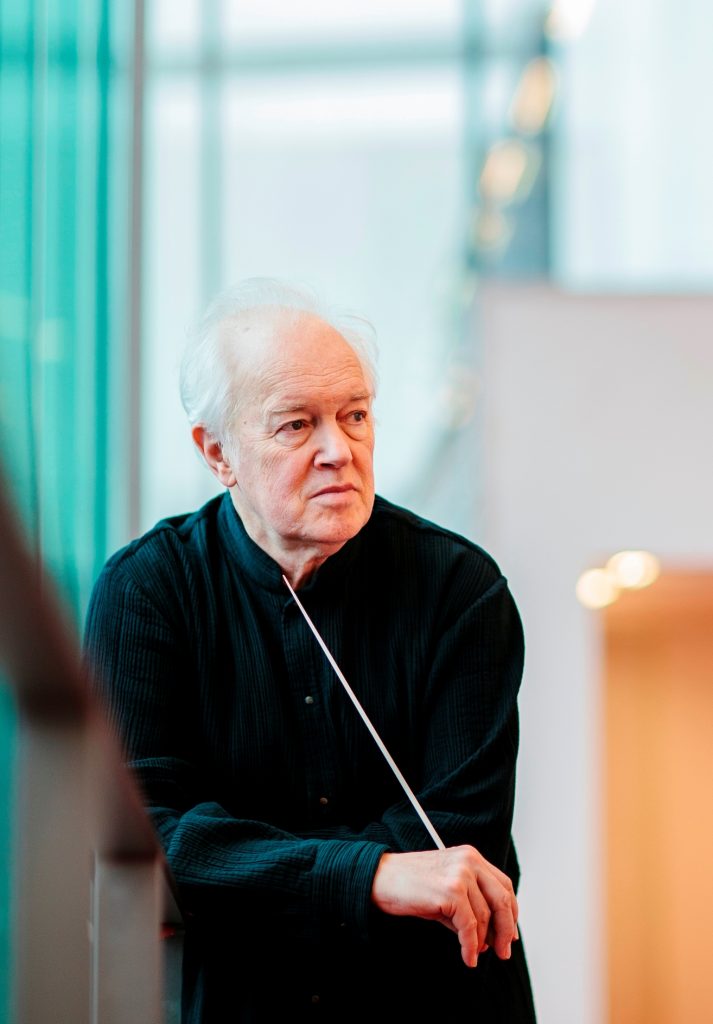San Diego Symphony Returns to The Conrad in La Jolla for a Concert of Bach and Haydn
On Friday, the San Diego Symphony returned to The Conrad in La Jolla in its chamber orchestra configuration. Under the baton of San Diego’s Principal Guest Conductor Edo de Waart, the orchestra offered accomplished performances of two concertos by J. S. Bach and an early Haydn symphony.
Edo de Waart wisely opened this concert with Bach’s Orchestral Suite No. 2 in B Minor, BWV 1067, featuring Principal Flute Rose Lombardo in the prominent solo role. Supported by an ensemble of 14 strings and harpsichord, Lombardo’s warm, lustrous timbre and her sparkling figurations easily charmed the audience. While the composer did not title this engaging work “concerto,” it certainly has many of the hallmarks of this musical genre, and de Waart treated the Suite as a concerto. Those who are familiar with Bach’s Flute Sonata in B Minor, BWV 1030, know how extraordinarily inventive the composer could be for the transverse flute in this dark key.I was taken by Lombardo’s dreamy, beautifully shaped account of the Sarabande and her elegant duo with Principal Cello Yao Zhao in the Polonaise. Edo de Waart drew an enticing sonority and transparent texture from the strings and chose tempos that favorably revealed the composer’s contrapuntal genius.
Concertmaster Jeff Thayer and Principal Oboe Sarah Skuster took the solo roles in J. S. Bach’s Concerto for Violin and Oboe in C Minor, BWV 1060. Few oboists match Skuster’s sumptuous sonority and supple melodic grace; it was pure delight to hear her pursue Bach’s sinuous lines, especially her emotionally rich account of the Adagio. Thayer provided complementary finesse with his equally effulgent violin lines, although de Waart should have kept the ensemble violins quieter in the fast outer movements, because they tended to overpower Thayer’s fine solo work.
According the advance publicity and the printed program book for the orchestra’s February concerts, the work following intermission was to be Richard Strauss’s Metamorphosen for 23 Solo Strings, an extraordinary work Strauss completed in the closing months of World War II, a commission from the noted Swiss conductor Paul Sacher of the Collegium Musicum Zürich. Music historians have described Metamorphosen as one of the iconic—albeit infrequently played—masterpieces of 20th-century music.
Edo de Waart and the San Diego Symphony did not, however perform this Strauss work, Instead, they played Samuel Barber’s familiar Adagio for Strings. While the Adagio for Strings is a fine, short orchestral composition, even the composer complained of its abundant over programming, and on this program it proved a weak substitute for Metamorphosen.
I suggest going online and taking in the You Tube performance of Strauss’s Metamorphosen by the Norwegian Chamber Orchestra recorded in 2016. These outstanding musicians play the 26-minute work entirely from memory, without a conductor but following on the lead of their Concertmaster. This performance reveals the depth and profundity of Strauss’s late work, which resides in a far different league from the beautifully simple, elegiac Barber work. Hearing Metamorphosen at The Conrad could have given this program the substance it lacked.
The San Diego Symphony filled The Conrad stage with some 35 musicians for the Haydn Symphony No. 49 in F Minor, La passione. Overall a rather solemn symphony for a composer whose hallmark is Enlightenment congeniality, Symphony No. 49 departs from the dark, minor mode only in the Trio of the Menuet, Edo de Waart drew a welcome calculated fury from the Allegro molto movement, yet the orchestra maintained splendidly disciplined ensemble unity. The Finale’s buoyant tempo brought this shortened concert at The Conrad to a brisk conclusion.
This concert was presented by the San Diego Symphony at La Jolla’s Conrad Prebys Performing Arts Center on Friday, February 9, 2024. It will be repeated Sunday afternoon, February 11, 2024.

Ken Herman, a classically trained pianist and organist, has covered music for the San Diego Union, the Los Angeles Times’ San Diego Edition, and for sandiego.com. He has won numerous awards, including first place for Live Performance and Opera Reviews in the 2017, the 2018, and the 2019 Excellence in Journalism Awards competition held by the San Diego Press Club. A Chicago native, he came to San Diego to pursue a graduate degree and stayed.Read more…


“Enlightenment.” Good one.